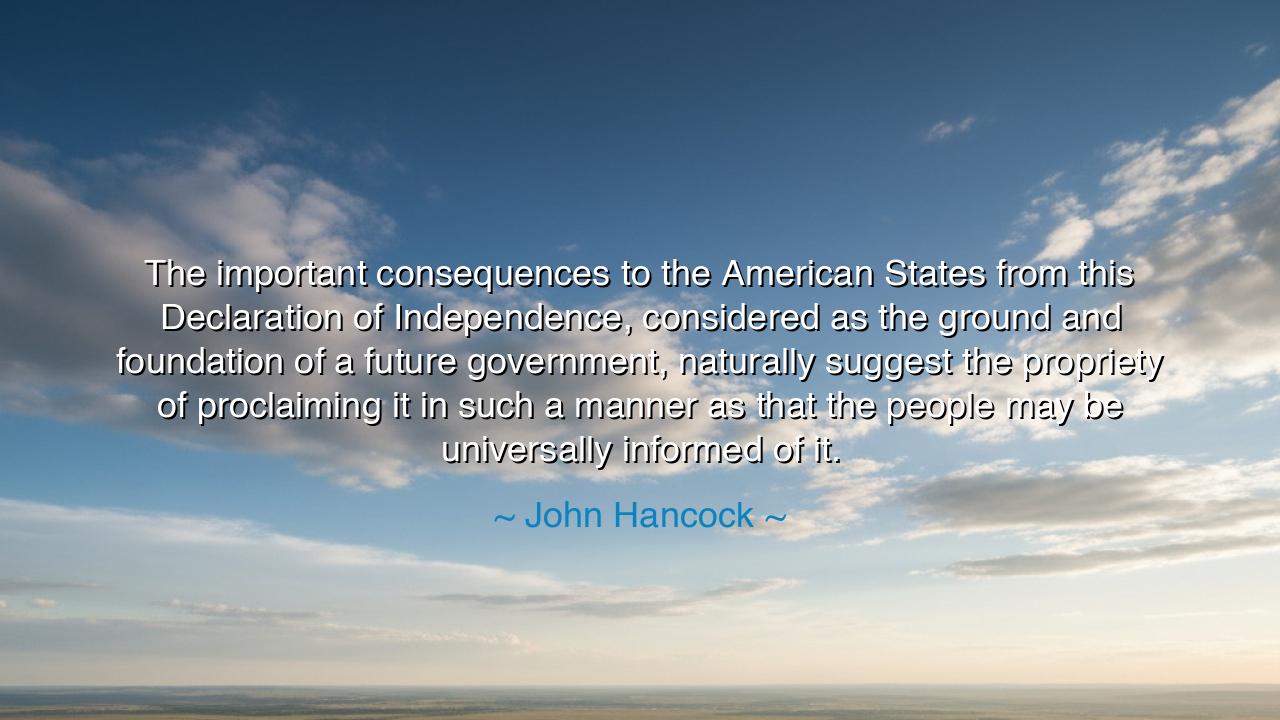
The important consequences to the American States from this
The important consequences to the American States from this Declaration of Independence, considered as the ground and foundation of a future government, naturally suggest the propriety of proclaiming it in such a manner as that the people may be universally informed of it.






In the words of John Hancock, “The important consequences to the American States from this Declaration of Independence, considered as the ground and foundation of a future government, naturally suggest the propriety of proclaiming it in such a manner as that the people may be universally informed of it,” we are given insight into the foundational principles that guided the birth of the United States. Hancock speaks to the immense responsibility of informing the people about their newfound freedom and the future that lies ahead. He emphasizes that such a declaration, pivotal in the formation of a nation, should not only be heard by a few but should resonate with the masses, for it is the people who must understand and carry the weight of this new government.
This idea of public declaration and education on matters of state and freedom has its roots in the great traditions of the ancients. The Greek philosophers, particularly Socrates and Plato, understood the importance of a well-informed citizenry for the stability of a just society. Socrates, despite his disdain for popular opinion, believed that the foundation of a meaningful society lay in the dialogue between the leaders and the people. For a government to be truly legitimate, it must be based on the understanding and consent of those it governs. Plato, in The Republic, argued that a just society could only exist if the people were educated in the principles of virtue and wisdom. Hancock’s words reflect this ancient wisdom: the people must be informed, for it is through knowledge that they can engage in their own governance and fulfill their civic duties.
In the same vein, Cicero, the great Roman statesman and philosopher, emphasized that for a republic to endure, its citizens must be well-versed in the values and principles that hold the state together. Cicero wrote that the strength of a republic lies not in its laws alone, but in the shared understanding of its foundational ideals. The Roman Republic itself, with its ideals of liberty, justice, and civic duty, was a system that depended on the knowledge and engagement of its people. Hancock’s call to proclaim the Declaration of Independence far and wide aligns with this ancient belief: a people who do not understand the freedom they possess will be powerless to protect it.
Hancock’s words also echo the vision of George Washington, who, as the first president of the United States, understood the necessity of public participation in the new government. Washington recognized that a government founded on democratic principles required the active involvement of its citizens. He believed that to ensure the stability of the young republic, the people must be educated about their rights and responsibilities. Just as Hancock emphasized the need for universal awareness of the Declaration, Washington’s leadership was rooted in a belief that the future of the nation depended on the enlightenment and engagement of its people.
The significance of Hancock’s statement lies not only in the historical context of the American Revolution but also in the broader principle that governs any true democracy: information is power, and that power must be shared. A government that operates in secrecy, or that excludes the people from understanding the principles upon which it stands, is destined to be fragile and corrupt. As Hancock suggests, a declaration as monumental as the Declaration of Independence must be proclaimed openly, ensuring that every citizen understands its weight, its purpose, and its potential consequences. Only then can a society rise to meet the challenges of self-governance.
The lesson to be learned from Hancock’s words is as relevant today as it was in 1776: for any society to flourish, its people must be educated and informed. Whether it is through the spread of knowledge, the open discussion of principles, or the proclamation of new ideals, the people must be aware of the foundations upon which their society is built. Hancock’s insistence that the Declaration of Independence be widely shared was not just a call to inform, but a call to action—to empower every citizen to claim their rights and responsibilities in the new republic. It is a reminder that freedom is not just a gift, but a burden that requires vigilance and understanding.
In practical terms, this calls us to be vigilant in the pursuit of knowledge and to advocate for systems that promote education and public awareness. It is our duty, as members of any society, to ensure that the principles upon which our societies are built are clearly communicated and understood by all. Whether in matters of government, social justice, or human rights, we must proclaim the truths we hold dear, ensuring that every member of the community is informed, engaged, and empowered to act. As Hancock showed us, the strength of a nation lies not in its leaders alone, but in the unified knowledge and engagement of its people.






AAdministratorAdministrator
Welcome, honored guests. Please leave a comment, we will respond soon